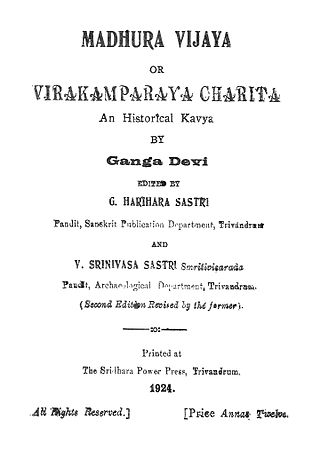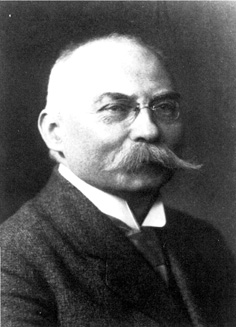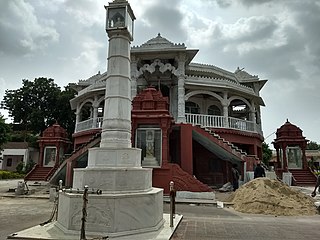Related Research Articles

Lokesh Chandra is a prominent scholar of the Vedic period, Buddhism and the Indian arts. Between 1942 and 2004, he published 576 books and 286 articles.
Simon Theodor Aufrecht was a German Indologist and comparative linguist. He was the first Professor of Sanskrit and Comparative Philology at the University of Edinburgh, and subsequently spent two decades as Professor of Indology at the University of Bonn.

Arthur Coke Burnell was an English civil servant who served in the Madras Presidency who was also a scholar in Sanskrit and Dravidian languages. He catalogued the Sanskrit manuscripts in southern India, particularly those in the collections of the Tanjore court collections. He was, with Henry Yule, a co-compiler of the Hobson-Jobson, a compendium of Anglo-Indian terms.

Saraswathi Mahal Library, also called Thanjavur Maharaja Serfoji's Saraswathi Mahal Library is a library located in Thanjavur (Tanjore), Tamil Nadu, India. It is one of the oldest libraries in Asia established during 16th century by Nayakar kings of Thanjavur and has on display a rare collection of Palm leaf manuscripts and paper written in Tamil and Sanskrit and a few other indigenous languages of india. The collection comprises well over 49,000 volumes, though only a tiny fraction of these are on display. The library has a complete catalog of holdings, which is being made available online. Some rare holdings can be viewed on site by prior arrangement. Encyclopedia Britannica mentions the library as the "Most remarkable library of India".

The 'Bhavishya Purana' is one of the eighteen major works in the Purana genre of Hinduism, written in Sanskrit. The title Bhavishya means "future" and implies it is a work that contains prophecies regarding the future.
Allah-Upanishad or Allopanishad is a Sanskrit apocryphal text with many Arabic words generally argued and believed to be written in India in 16th century during the reign of the Mughal emperor Akbar. It describes Akbar as a messenger or prophet of God. Critics generally have not seen or studied the scriptures. The word Allah is being used in the sanskrit to denote the Shakti or devi or female aspect of the god. It is mainly used in the tantric scriptures of devi worship. Hum is a bija mantra and is attached to the word Allah and forms Allahumma. In short Allah Upanishad is a tantric scripture for devi worship.

Rao Sahib Saravanapperumal Vaiyapuri Pillai was a renowned lawyer and Tamil scholar. An advocate by profession, he edited and published several Tamil classics from original manuscripts. He is best remembered as the editor of the Tamil lexicon published by the Madras University in the 1920s. He was a voracious reader and had in his own private collection thousands of books in Tamil, English, Sanskrit and Malayalam. His collection also included hundreds of palm-leaf manuscripts. This collection was later donated to the National Library of India in Kolkata. .
The Lokavibhāga is a Jain cosmological text originally composed in Prakrit by a Digambara monk, Sarvanandi, surviving in a later Sanskrit translation by one Siṃhasūri. It the oldest known Indian source to use zero as number. Surviving manuscripts of the Lokavibhāga are listed in v.26 of the New Catalogus Catalogorum. Parts of the Bakhshali Manuscript on arithmetic, which does use a physically written symbol for zero, have been carbon-dated, but the results of this dating are puzzling and are still being debated.

Vishwanathan Venkatachalam was an eminent Sanskrit scholar. He served as the vice-chancellor of Sampurnanand Sanskrit University, Varanasi, India for two terms. He was awarded the Padma Shri in 1989 by the Government of India for his valuable contribution to the field of Sanskrit research and education.

Krishna Venkateswara Sarma (1919–2005) was an Indian historian of science, particularly the astronomy and mathematics of the Kerala school. He was responsible for bringing to light several of the achievements of the Kerala school. He was editor of the Vishveshvaranand Indological Research Series, and published the critical edition of several source works in Sanskrit, including the Aryabhatiya of Aryabhata. He was recognised as "the greatest authority on Kerala's astronomical tradition".
Venkataraman Raghavan (1908–1979) was a Sanskrit scholar and musicologist. He was the recipient of numerous awards, including the Padma Bhushan and the Sahitya Akademi Award for Sanskrit, and authored over 120 books and 1200 articles.

Madhurā Vijayam, meaning "The Victory of Madurai", is a 14th-century C.E Sanskrit poem written by the poet Gangadevi. It is also named Vira Kamparaya Charitham by the poet. It chronicles the life of Kumara Kampana, a prince of the Vijayanagara Empire and the second son of Bukka Raya I. The poem describes in detail, the invasion and conquest of the Madurai Sultanate by the Vijayanagara empire.

Eugen Julius Theodor Hultzsch was a German indologist and epigraphist who is known for his work in deciphering the inscriptions of Ashoka.
Tamil Lexicon is a twelve-volume dictionary of the Tamil language. Published by the University of Madras, it is said to be the most comprehensive dictionary of the Tamil language to date. On the basis of several precursors, including Rottler's Tamil–English Dictionary, Winslow's Tamil–English Dictionary, and Pope's Compendious Tamil–English Dictionary, work on a more exhaustive dictionary began in January 1913 and the first forms were printed by the end of 1923. Initially estimated at ₹ 100,000, the total cost of the project came to about ₹ 410,000. The first edition had 4,351 pages in seven volumes, including a one-volume supplement, which were printed between 1924 and 1939 and had 104,405 words, with an additional 13,357 words in the supplementary volume, totaling to 124,405 words in all.
Agastya Samhita is the title of several works in Sanskrit text attributed to the ancient sage (rishi) Agastya.
Sangita, also spelled Samgita or Sangeeta, refers to "music and associated performance arts" in the Indian traditions. According to Guy Beck, the root "saṃ-" implies "combining, coming together, convergent wholesome blending, unison" in the context of musical arts. Sangita connotes any form of singing with music, harmonious recitation or chorus singing in particular. In some medieval era literary genre such as the Puranas and poetic texts such as Kathasaritsagar, a related term Sangita-shastra and Sangita-vidya mean the "art, science or knowledge of singing and dancing with music". According to Alison Arnold and Bruno Nettl, the modern term music fails to capture the historic sense of "Sanskrit sangita and Greek mousike". In the Indian tradition, the term sangita includes melodious singing, rhythmic dancing, instrumental music, classical, provincial, ritual chanting and incidental forms of music-related performance arts.

The Vajrasuchi Upanishad is an important Sanskrit text and an Upanishad of Hinduism. It is classified as one of the 22 Samanya (general) Upanishads, and identified as a Vedanta text. It is attached to the Samaveda.
Sharngadhara-paddhati is an anthology of Sanskrit-language short poems (subhashita) from India. It was compiled by Sharngadhara in 1363.

Satyanatha Tirtha ; IAST:Śrī Satyanātha Tīrtha), also called Abhinava Vyasaraja, was a Hindu philosopher, scholar, theologian, logician and dialectician belonging to the Dvaita order of Vedanta. He served as the twentieth pontiff of Uttaradi Math from 1660 to 1673. He was a fiery and prolific writer and very ambitious of the glory of Dvaita Vedanta. He is considered to be one of the stalwarts in the history of the Dvaita school of thought, on account of his sound elucidations of the works of Madhvacharya, Jayatirtha and Vyasatirtha. Three of his polemically themed doxographical works are reminiscent of "Vyasatraya". His refutation work Abhinava Gada is a devastating criticism of Appayya's Madhvamathamukhamardhana. His independent treatise Abhinava Chandrika is considered a brilliant work relating to the Brahma Sūtras, being a commentary on Jayatirtha's Tattvaprakashika. His work Abhinava Tarka Tandava refuted the works of rival systems, especially those of Prabhākara of Mimamsa, Ramanuja's Visistadvaita, and Gangesha Upadhyaya, Raghunatha Siromani of the Nyaya school, on the same lines as Vyasatirtha's Tarka Tandava. Indologist B.N.K.Sharma wrote, "His energy and determination to crush out the rivalry of Monism is reflected even in the choice of the titles of some of his works, four of which go by the name "Paraśus" ".

Bijolia Parshvanath Temple or Tapodaya Teerth Kshetra is a Jain pilgrimage center located in Bijolia town in Bhilwara district of Rajasthan.
References
- ↑ "Manuscripts | Ministry of Culture, Government of India". indiaculture.gov.in. Retrieved 2024-03-14.
- 1 2 University of Madras.; Aufrecht, Theodor; Dash, Siniruddha.; Ramabai, E. R.; Veezhinathan, N.; Kunjunni Raja, K.; Raghavan, V. (1949). New catalogus catalogorum: an alphabetical register of Sanskrit and allied works and authors. Madras University Sanskrit series ;18. Madras: University of Madras.
- ↑ "Short of funds, Sanskrit project stays idle". The Hindu. 2013-02-11. ISSN 0971-751X . Retrieved 2024-03-14.